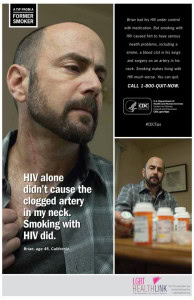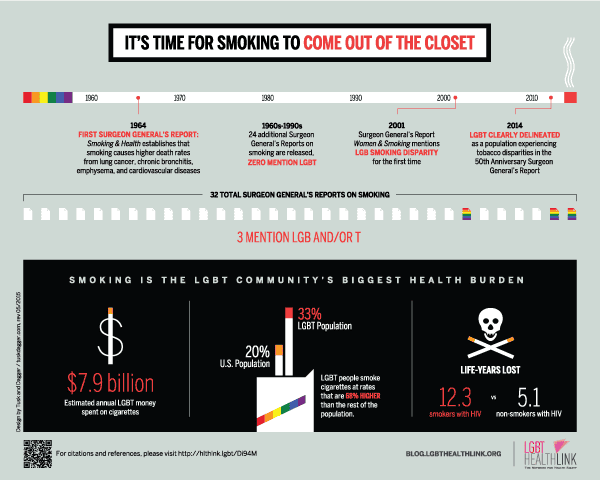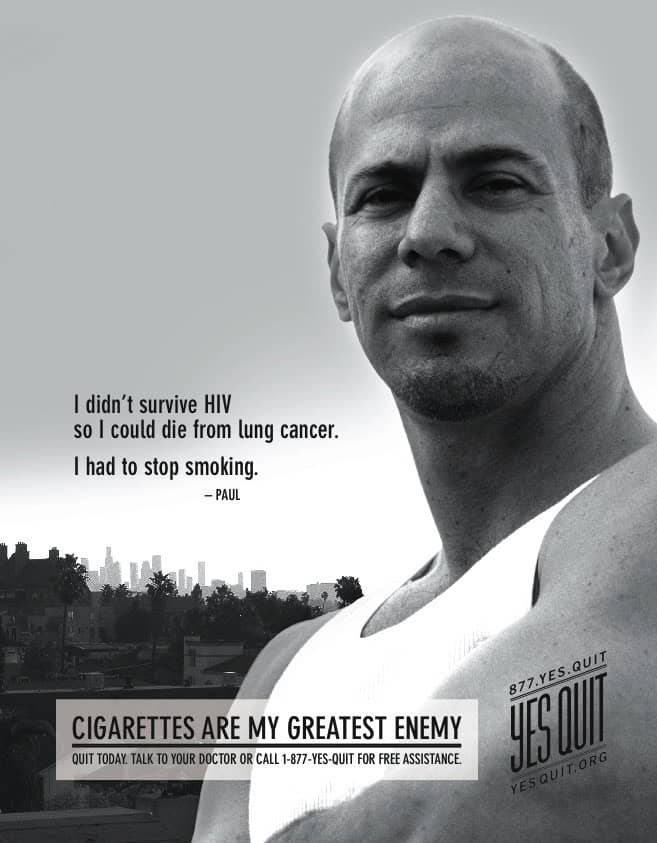Smoking has been on the decline in the United States for many years. But within the LGBT community, the smoking rate remains higher than in the general population. According to the LGBT National Tobacco Control Network, individuals in the LGBT community are 50% to 200% more likely than others to be addicted to tobacco.
Smoking is, we know by now, linked with some very bad health outcomes: higher risk for coronary heart disease, higher risk for cancers, and an overall shorter lifespan. For smokers who are also living with HIV, the effects are even more detrimental. Smoking weakens the immune system, which makes it harder to fight off infections associated with HIV. It can also increase the risk of heart disease and HIV-associated malignancies and other cancers that attack people living with HIV and AIDS.
Faced with those statistics and health outcomes, national and state health agencies and organizations are trying to do something about it.
 Healthcare experts have attributed higher-than-average smoking rates in the LGBT community to greater social stress and targeted ad campaigns. Some LGBT smokers say it’s also part of the social scene; particularly for people socializing in bars, having a cigarette in your hand as you talk to people is a habit that’s easy to fall into.
Healthcare experts have attributed higher-than-average smoking rates in the LGBT community to greater social stress and targeted ad campaigns. Some LGBT smokers say it’s also part of the social scene; particularly for people socializing in bars, having a cigarette in your hand as you talk to people is a habit that’s easy to fall into.
It’s not a new trend, but it’s one that’s only recently started to get attention – and action – from public health officials.
For the first time ever, the Surgeon General in 2014 not only mentioned the LGBT smoking disparity, but clearly delineated the LGBT community as one experiencing tobacco disparities in the 50th Anniversary Surgeon General’s Report on Tobacco and Health, according to the Network for LGBT Health Equity. And in 2012, the CDC conducted its first National Adult Tobacco Survey that included LGBT-specific information.
The Network for LGBT Health Equity is one of six CDC-funded tobacco disparity networks, and its goal is to enhance LGBT health by eliminating tobacco use, along with other health disparities in the community.
The Network’s director has been an outspoken proponent of smoking cessation for the LGBT community, saying that smoking is the biggest health problem LGBT populations face. Despite the high rate of smokers and the amount of money LGBT individuals spend on smoking – $7.9 billion every year – the health problems that smoking causes are overshadowed by other health issues like suicide and HIV prevention, the Network says.
To combat high smoking rates in the LGBT population, the Network advocates for policy change, partly by connecting LGBT tobacco and wellness professionals so that they can share lessons and monitor gaps. They also train state health departments and other policymakers in LGBT cultural competency and help build bridges between those groups and local LGBT health specialists.
There are more localized campaigns, too. In Texas, the Department of State Health Services (DSHS) has launched a version of  Yes Quit, a smoking cessation campaign, that targets the LGBT community specifically. Yes Quit – both the general quit line and the LGBT-targeted campaign – provides materials to healthcare providers as well as to smokers.
Yes Quit, a smoking cessation campaign, that targets the LGBT community specifically. Yes Quit – both the general quit line and the LGBT-targeted campaign – provides materials to healthcare providers as well as to smokers.
For providers, the emphasis is on asking patients about tobacco use and referring patients to the quit line. And when a clinician – which can also include a case manager from an HIV service organization – submits a referral for a patient, that patient can get up to five telephone cessation counseling sessions and two weeks of nicotine replacement for free.
The campaign also reaches out directly to LGBT smokers, appealing to them to think about the health risks associated with smoking.
Will it work? Now may be the perfect time for the Yes Quit campaign to reach the LGBT community. Marcus Freiberger, an Austin resident who smokes, says he’s noticed more pressure in the gay community to lay off smoking. He admits to ducking out of sight from friends when he lights up sometimes. He’s been an on- and off-again smoker for eight years, but he says he’s ready to quit.
Beyond social pressure, Freiberger has another reason to give up smoking: he is HIV positive, which means he runs the risk of more health complications from smoking.
“I do worry about that,” Freiberger says. “I justify it because I’m so active and I do healthy activities. But I’m not stupid. My grandpa had cancer from smoking, and y grandma died of cancers. So it’s one of those things, for my health, I’m aware of. And I’m about ready. I’m about to get on Chantix [a prescription that helps with smoking cessation.] And with all the yoga and running I do, it doesn’t make sense to smoke cigarettes.”
For more information and statistics surrounding smoking including resources to help smokers quit, please visit yesquit.org.







































